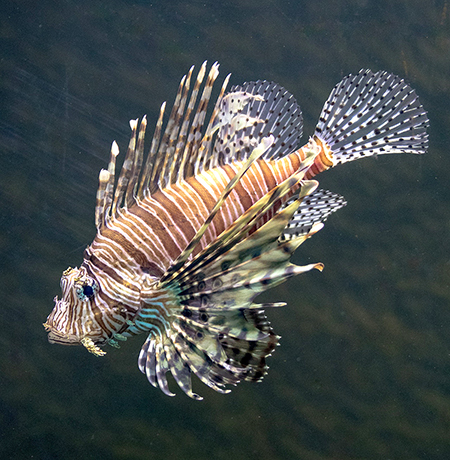
An invasive species, lionfish, has become a threat to native fish species in Florida waters of the Gulf and have been found in the western Gulf, too. They can produce thousands of eggs per year. Although lionfish are served in Caribbean restaurants, Florida feared the damage to native fish. Removal efforts collected 24,699 Lionfish in one harvest. Will this happen in Texas waters? (Photo courtesy PublicDomainPictures.net)
by John Jefferson
A recent news item reported lionfish had been detected in the Gulf off the Texas coast.
I immediately called my granddaughter, Laura Jefferson Heinen and her husband, Ian. They are our family adventurers — having once hiked across Iceland, became engaged atop Guadalupe Peak (the highest point in Texas), and photographed a black bear NEAR their campsite in the Big Bend. They currently live in the Bahamas and occasionally eat lionfish.
Laura sent me the picture of one Ian speared in the bay right out their back door.
Lionfish are extremely hard to handle. (see photo). Their spines are venomous, and their only possible natural predators seem to be Ian and other spear-anglers. Since they hang out around reefs, they usually don’t even risk getting hit by boat props. Predator fish may leave them alone for obvious reasons.
They’re relative newcomers in Western Hemishere waters. According to an article by Hunter Morrison reported on WUWF, a Florida NPR station, it’s not clear where they came from or how they got here. They could have been released by human aquarium owners who lazily and probably illegally dumped them — like the pythons that were released, there. And you probably know how that has worked out. Dastardly!
Lionfish were first reported in waters around Florida in the 1980s. Now they’ve moved into the western Gulf. How profuse are they in our waters? Good question.
Hanna Bauer, a marine biologist with Texas Parks and Wildlife confirms that they are “certainly” here. How many, though, is not accurately known at present.
“Since it’s nearly impossible to catch lionfish on a hook and line, sitings in the water via Scuba divers are the primary source of information and mostly occur on popular dive sites,” Ms. Bauer told me.
If my friend Mark Nichols, owner of D.O.A. Lures in Florida, can’t develop a lure for them, I doubt if anyone can.
They are exotic looking, and it would be cool just to see one. Hanna added that Texas waters do not have the densities of lionfish that Florida has, but she suspects more in the western Gulf than are reported. Only limited studies on their impact on native fish have been done but she says they have seen evidence of predation. Florida and the Caribbean have reported native fish populations have been reduced.
Lionfish feed on small fish. I ask Ian if he had heard of their depredation and any effect it has had. He replied that he had seen notices about it in Florida. His wife, Laura, said there had been Facebook postings asking people to kill them.
He also acknowledged that the number of spear fishers increased for a while in the waters near their Bahama home.
“I guess we did a good job of culling them out,” he said. ”There aren’t nearly as many as there were when we first arrived here.” He added that he saw one about a month ago and that they do reproduce quickly and abundantly, however.
JJ




